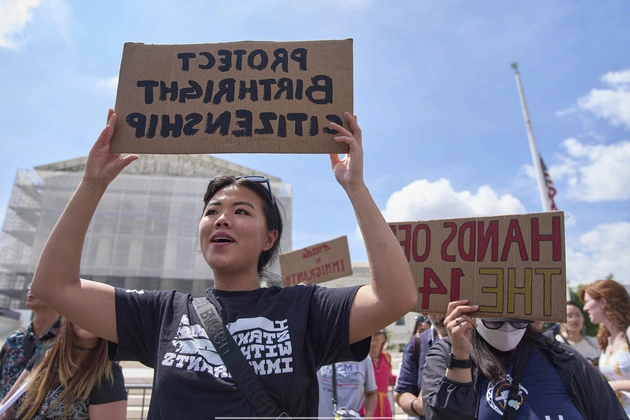
President Donald Trump’s executive order purporting to end birthright citizenship found no traction at the Supreme Court Thursday, but the justices sounded inclined to rein in a legal remedy judges have used to halt many of Trump’s early policy moves, from restricting immigration to cutting federal spending to ending anti-diversity initiatives.
The Legal Battle
Three district judges have deployed that tool — known as a nationwide injunction — to block Trump from implementing his birthright citizenship order. None of the justices spoke up in defense of the order’s legality during more than two hours of oral arguments, and several suggested that the order is almost surely unconstitutional.
Conservative Justices’ Perspective
At the same time, the conservative justices seemed intent on devising a way to prevent, or at least limit, district judges from issuing nationwide injunctions against federal policies. Instead, those justices said, judges should focus on granting remedies that apply to the particular individuals or groups who sued, or to a clearly defined class of similarly situated people.
“Let’s put out of our minds the merits of this, and just look at the abstract question of universal injunctions,” Justice Samuel Alito said. “The practical problem is that there are 680 district court judges … and all Article III judges are vulnerable to an occupational disease, which is the disease of thinking that ‘I am right and I can do whatever I want.’”
Liberal Justices’ Concerns
Several justices suggested that, when a broad judicial remedy is needed, the proper course is for the case to be handled as a class-action lawsuit, rather than through a blanket injunction that applies everywhere in the country. To bring a case as a class action, challengers often must surmount special procedural obstacles and, typically, there is no relief until the suit is concluded.
The court’s liberal justices highlighted what they said were practical problems to limiting nationwide injunctions. Without them, the executive branch might be able to enforce a policy that one court has declared illegal against some people — or in some jurisdictions — but not others.
Justice Ketanji Brown Jackson made that point to Solicitor General John Sauer, who defended Trump’s birthright citizenship order and urged the court to eliminate nationwide injunctions.
“Your argument seems to turn our justice system — in my view at least — into a ‘catch me if you can’ kind of regime, from the standpoint of the executive, where everybody has to have a lawyer and file a lawsuit in order for the government to stop violating people’s rights,” Jackson said. “I don’t understand how that is remotely consistent with the rule of law.”











